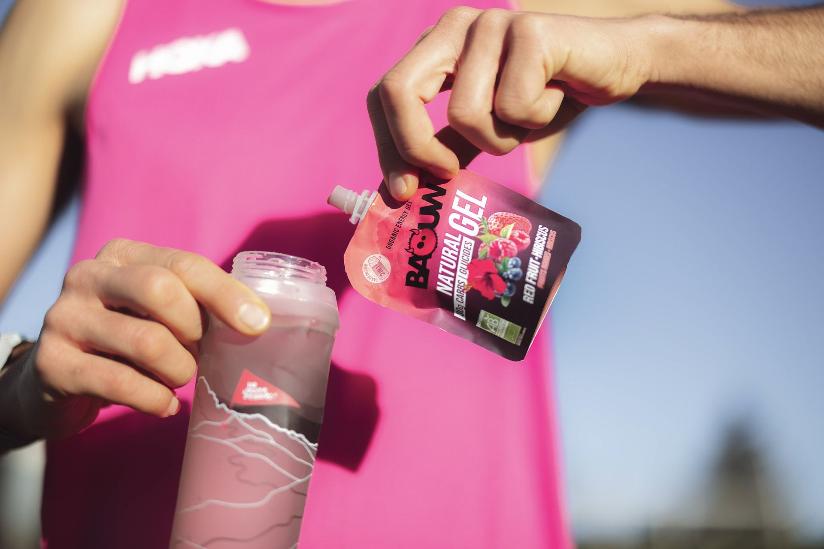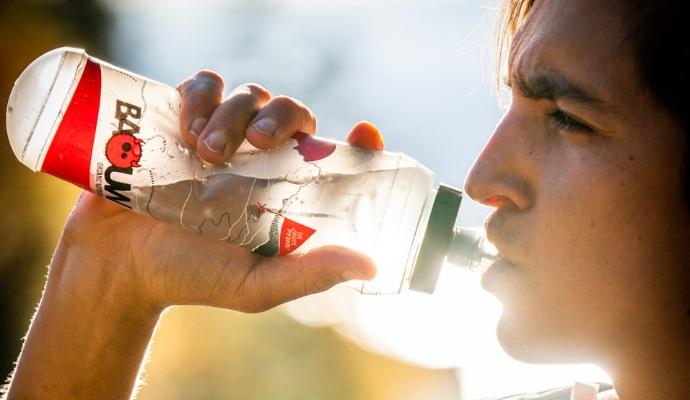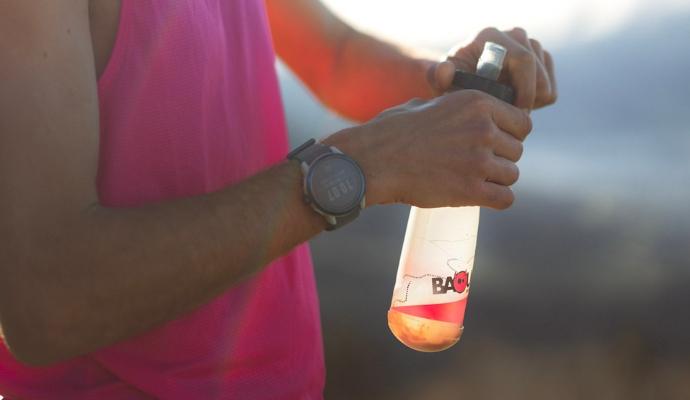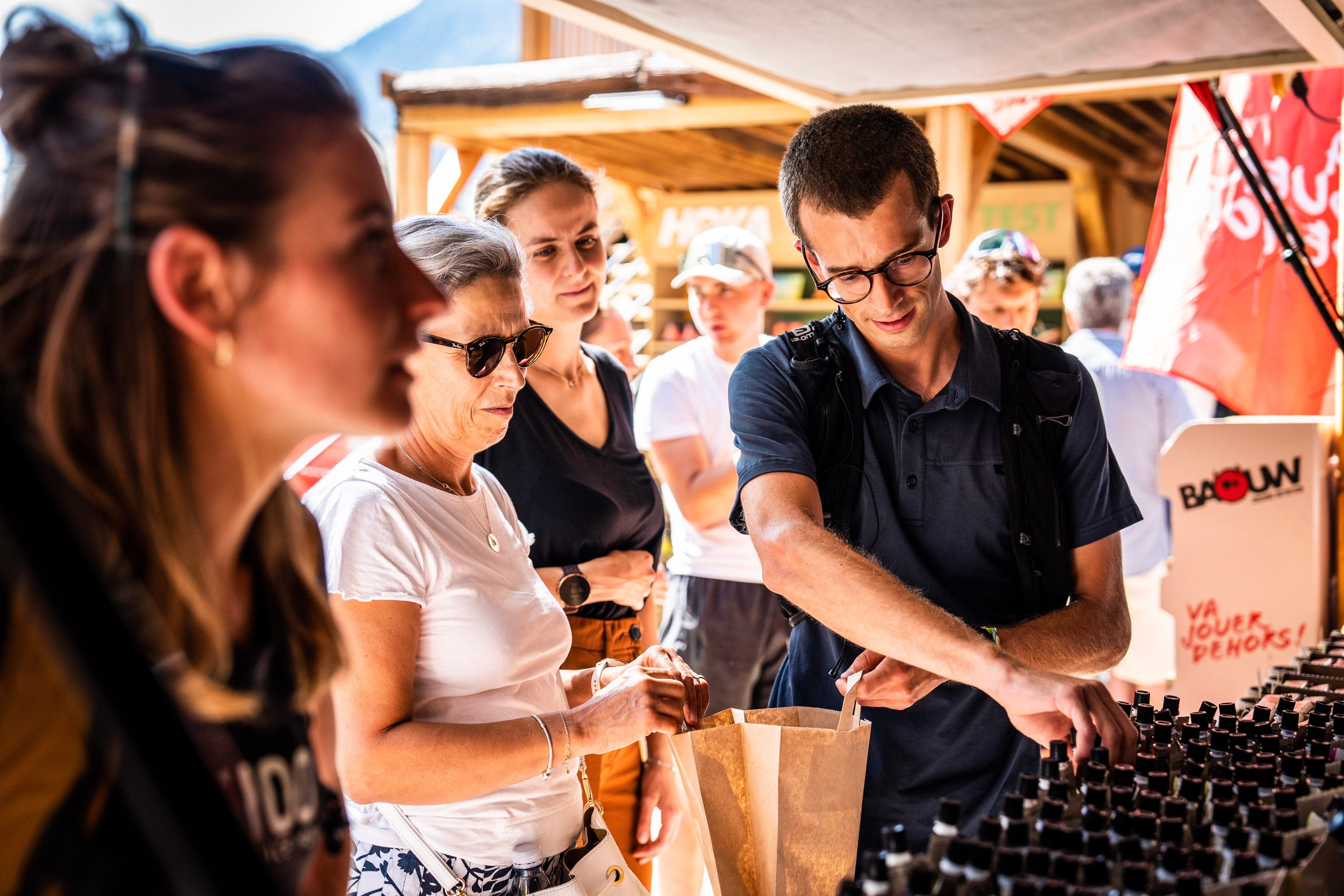Sport, water, performance!
Water is life. This maxim, full of meaning for the environment that surrounds us, is just as meaningful for the human body. Water makes up almost 60% of our body mass and ensures that it functions properly: it allows good blood circulation, ensures thermoregulation, protects essential organs, lubricates our joints and plays a part in digesting and assimilating the food we eat.
The same applies to sports: hydration plays a vital role. However, we often see that hydration is relegated to second place among the keys to optimising performance in athletes. This is a mistake.Sports nutritionis a whole concept that combines two pillars: hydration and diet. Proper hydration is therefore essential for athletic performance. You can have the best diet strategy, the best physical preparation, the best equipment... but if you fail to drink properly, everything will fall apart.
We therefore suggest focusing on hydration before, during and after exercise. Because that is our mission at Baouw: to provide you with all the knowledge you need to take full control of your sporting activities and your health!
To do this, we called on two specialists in the field: Benoit Nave, our expert nutritionist and co-founder of Baouw, and Marion Counil, a dietician-nutritionist and seasoned runner.
Overview of the consequences of water deficit
When an athlete does not drink enough fluids, the body quickly sounds the alarm. Even moderate dehydration can impact performance, recovery and overall health. The main consequences of dehydration for athletes are as follows:
- baisses de performance : dès 1 à 2% de perte de poids en eau, tes performances sont réduites de 10 à 20%. Si tu t’hydrates insuffisamment, tu vas rapidement ressentir une diminution de ton endurance, une augmentation de ta perception de l’effort et une baisse de ta coordination motrice et de ta concentration.
- Risks of overheating: water is essential to the thermoregulation process. Without sufficient water intake, the body sweats less efficiently, body temperature rises sharply, and all of this can lead to what we want to avoid, especially in the middle of a workout: heatstroke.
- Risque d'apparition de crampes : une hydratation insuffisante favorise l’apparition de cramps during physical exertionand muscle soreness, and slows down your recovery.
Hydration before exercise: stock up!
If you spend months training to achieve your goal, you don't want to make mistakes in the week leading up to your competition that could hinder your performance. It would be a shame: you stick to atriathlon diet, but you don't plan your hydration! So, to prepare as well as possible for your pre-competition week, it's important to focus on two areas: intracellular storage and extracellular storage, as Benoît Nave explains.
During your pre-competition week, it is important to maximise your glycogen reserves by maximising your carbohydrate intake. The good news? By doing this, you will also optimise your water reserves. Each gram of carbohydrate you consume will be accompanied by 2.7g of water that will enter the muscle cell, where muscle glycogen is stored. This is pre-hydration at the intracellular level. To put it simply, the more carbohydrates you consume and therefore the more glycogen you store, the more water you will store. Obviously, this is only up to a certain limit, because beyond 600-700g of muscle glycogen, you can't store any more!
How can you prepare for hydration before the event?
During your last two relatively difficult sessions (e.g. on D-7 and D-4), remember to pay close attention to replenishing your glycogen stores. If you cook 100g of rice in water, you will end up with 300 to 400g of rice on your plate. This water is stored when you eat carbohydrates. This is the first stage of pre-storage, which is optimal if carbohydrate replenishment is done correctly."
Benoît continues: "The second way to properly anticipate your hydration needs for a sporting event is to optimise your extracellular volume. Here, the day before the race, for example, it would be a good idea to consume sodium bicarbonate water by drinking a bottle of St-Yorre, for example. This will allow your body to trigger storage reactions and increase your plasma volume."
Let's get started with a hydration routine!
“In the days leading up to your competition, establishing a proper hydration routine can be beneficial to ensure you do not become dehydrated (for example, drink 1.5L to 2L at regular intervals, in small amounts). For those who are sensitive to it, pay particular attention to limiting your intake of sparkling water to avoid stomach upset.”
Hydration during exercise: you have to adapt!
It is important to remember that when you exercise, you sweat. Depending on the type of exercise (short, long, ultra-trail) and therefore the amount of time you will spend on the trails, as well as the weather conditions on the day (exercising in hot weatheror, conversely, in freezing cold weather), your sweat loss and therefore your fluid requirements will vary greatly.
Benoît explains why: "When you sweat, you lose water, of course, but that's not all. You also deplete your mineral reserves, mainly sodium (which is why you get white stains on your T-shirts when you sweat a lot), as well asmagnesiumand potassium. These minerals are calledelectrolytes. The key is to limit these losses by replenishing them through hydration."
Marion Counil also recommends establishing a routine: "It is always very difficult, if not impossible, to replenish as much fluid during exercise as you lose, so the goal is to drink regularly and in small amounts (2-3 sips every 15 minutes) to compensate as much as possible for sweat loss and avoid impacting your performance. It is entirely possible to train during your preparation to encourage your stomach to expand during exercise. In hot weather, you will sweat more profusely. It may therefore be a good idea to addelectrolyte tablets. to your drink to make it more concentrated. Conversely, if you are exercising in cool weather, you will sweat less but consume more energy to combat the cold, so it is a good idea to enrich your precious water with carbohydrates. And luckily, ourenergy drinksare designed to provide you with just that!
Benoit Nave adds: ‘On a short race, lasting up to 1 hour 30 minutes, it is not necessary to hydrate from a physiological point of view. However, hydration may be needed to cool down in hot weather to prevent hyperthermia. Remember that the shorter and more intense the effort, the more important it is to focus on fluid intake.”
Marion continues: ‘After three hours of exercise, it is strongly recommended that you implement a hydration strategy with a precise but adaptable roadmap.’
Benoît adds: "In cool temperatures, drinking 250ml of fluid per hour is sufficient. In warmer or even hot conditions, you may need to consume up to 700ml per hour. Beyond that, you risk saturating your intestines. Also, to optimise your intake, you will need to combineenergy gelsand/orenergy barswith a drink to compensate for your energy needs, which will increase as the hours go by."
Hydration after exercise: you need to recover!
Recovery immediately after high-intensity exercise and during the following week is just as important as the week before a competition. Just as you need to replenish your energy reserves before physical exertion to boost your chances of reaching the finish line, optimal hydration after exercise will help you recover more quickly and get back to training sooner.
Once again, as Benoît points out, the advice remains the same: "After strenuous exercise, you need to replenish your water reserves, mainly with waters rich in sodium bicarbonate to buffer the body's acidity: St-Yorre, Vichy Célestins, Arvie, Rozana, Badoit. If you drink pure water, you won't replenish your reserves and therefore you won't rehydrate." This is THE time to play theacid-base balancecard to help your body recover!
Marion adds: ‘It's important to drink water rich in electrolytes after running to restore the acid-base balance. During exercise, toxins accumulated as a result of physical exertion acidify your body. By drinking water with a high mineral content after exercise, you will buffer this acidity and alkalise your body.’ Want to know more about this topic? Feel free to read our article on thePRAL index,where we explain everything!
If you're one of the more adventurous, Marion advises you: ‘If you want to know your post-exercise needs in figures, you can use this formula: weight loss (pre-exercise weight - post-exercise weight) x 1.5 (which corresponds to 1.5 litres per kilo of body weight lost).
“Optimal hydration after exercise will help you recover more quickly and get back to training sooner".










